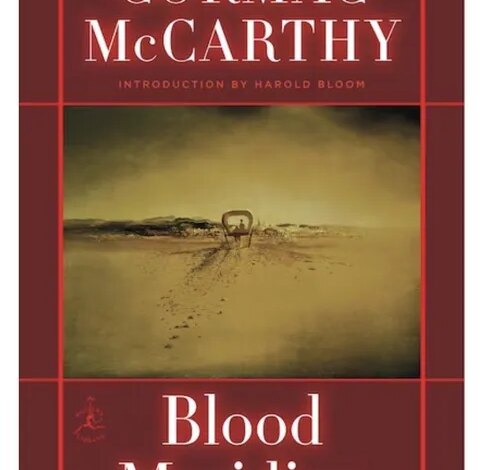Why is ‘Blood Meridian’ Cormac McCarthy’s most loved book?

In an attempt to explain the popularity of novelist Theodore Dreiser, the literary critic Lionel Trilling suggested it had something to do with Americans’ sense of reality. Trilling concluded that, for Americans, the rougher the artistic vision, the more invigorating and devoid of sentiment, the closer it must be to reality.
Dreiser’s novels appealed to his readers’ belief that facts are real brutal factsand the truth is always the cold hard truth.
Trilling’s insight goes some way to explaining the success of another American literary giant, Cormac McCarthy, who died last month. Since McCarthy’s passing, a deluge of appreciative retrospectives has targeted the author who carved his way into the conversation for the Nobel Prize in Literature.
His success extended beyond elite literary circles: several of his books were made into major Hollywood films (“All the Pretty Horses”; “No Country for Old Men”); “The Road” was selected for Oprah’s Book Club. But when I read “Blood Meridian” (1985), what many consider McCarthy’s best novel, I wondered, as Trelling once did with Dreiser, what exactly this author appealed to his audience.
Let me start by saying the obvious: “Blood Meridian” is a shocking book, as blood-soaked as the title promises and then some. The novel follows a motley crew of mercenaries through what is now the American Southwest and the Mexican Northwest, but in 1850, when the novel is set, was an area contested by the native inhabitants, Spanish settlers, and American mercenaries. Death abounds, but not just any death: dead babies hang from trees by their jaws, puppies are thrown into a river and then shot, all manner of innocents are killed, and their bodies are usually treated horribly. This is “death hilarious,” to borrow one of McCarthy’s unfortunate phrases, and the logic is ruthless. “Blood Meridian” adheres to its own version of the “Chekhov’s gun” principle – call it “McCarthy’s pups” – where everything the author introduces is sweetly destined to be clubbed a few pages later.
So why has this novel received so much praise and why do so many people seem to read it for pleasure?
Part of it is McCarthy’s strikingly strange prose. With unrelenting precision and imagination, he documents the grandeur of the desert landscape through which his protagonists drive chapter after chapter in search of victims. The desert mountains are particularly richly draped in a seemingly endless wardrobe of literary garb: there are “crumpled mountains of butcher paper” and “unrelenting mountain ranges rising out of nowhere like the backs of sea creatures in a Devonian dawn” and – at night from behind illuminated by distant flashes of lightning – “staccato mountains that spoke blue and barren from the void.”
Coincidentally, “staccato” also works as a description of the story’s curious pacing, in which McCarthy punctures the serenity of these natural scenes with acts of extraordinary human brutality.
There’s also a compelling philosophical dimension to ‘Blood Meridian’. McCarthy achieves a real existential charge by presenting characters who live in a world stripped not only of any obvious moral influence, but of any civilizing force. It is as if he were challenging his readers to rescue from such an unforgiving landscape a moral standard against which to test the heinous deeds of his protagonists.
In an environment so hostile to meaningful human activity, one character in particular experiments with meaning-making. Judge Holden, commonly referred to simply as “the Judge,” takes advantage of mercenary wanderings to collect samples from wildlife, explaining at one point that “only nature can enslave man and only when it existence of every last entity is dispelled and established. naked before him he will be the true ruler of the earth. The judge is brilliant and multi-talented and totally numb. Like the setting, he seems to challenge any superficial moralism.
This harsh view of human life is a powerful part of the book’s appeal: it fuels a haunting suspicion that we live too much in the midst of comforting illusions.
We hastily conclude that McCarthy must be right, that he pulls back the veil and shows us human nature red in tooth and claw: these are our own hearts, “whatever wilderness there is and whatever beasts.” “Blood Meridian” appeals to our secret fear that people’s hearts are full of wilderness and beasts, and we are grateful to be told this hard truth about ourselves.
But the human heart contains many other regions about which “Blood Meridian” is worryingly silent. The novel’s meager moral vision gives readers the impression that the highest human quality is a kind of ruthless determination. As readers, we accept McCarthy’s moral view—not because it reflects the breadth of our human experience, but because we fear it would be naive to persist in the reality of our more admirable qualities, such as generosity or thoughtfulness.
In another powerful description of the desert, McCarthy writes of lightning flashes that animate the mountains at night, “the sudden skyline stark and black and raging like a land of another order beyond whose true geology was not of stone, but of fear.” In its repeated flashes of brutality, “Blood Meridian” reveals that the novel itself is built on a geology of fear — fear that would lead us to ignore our lived experience of human goodness. We need not deny the dark underbelly that the novel so vividly depicts, but we must remember that the underbelly is not all of the human species.
Despite the villainy of the characters, the novel itself quietly points toward a fuller account of the human condition. The judge represents an overconfident and destructive drive for knowledge, a drive to catalog everything in order to claim it. “Everything that exists in creation without my knowledge exists without my permission,” he boasts.
In contrast, as the author, McCarthy offers a different version of the drive for knowledge, a way of knowing that does not seek to control: for example, in his meticulously loving recording of desert phenomena, or in the way the novel bears witness to and thus seeks to understand human cruelty without expect to eradicate it.
Just writing “Blood Meridian” testifies to the fact that curiosity and concern are also hallmarks of the human heart. They are less shocking than the dark corners in which the novel thrives, but they are no less real and, if anything, more important.

:format(webp)/https://www.thestar.com/content/dam/thestar/entertainment/books/2023/07/05/cormac-mccarthys-bloodiest-book-is-also-his-most-beloved-why/blood_meridian_cormac_mccarthy.jpg)


